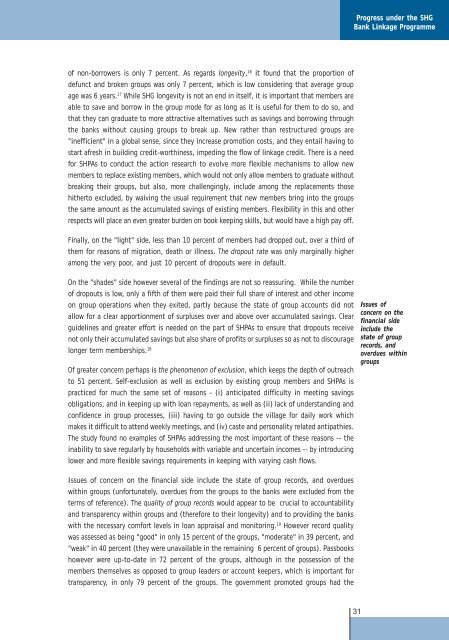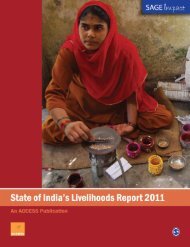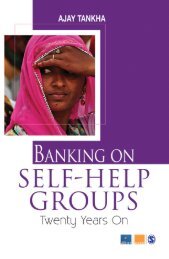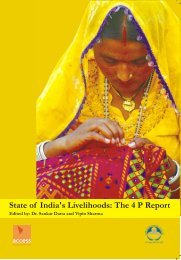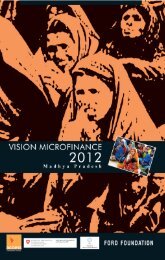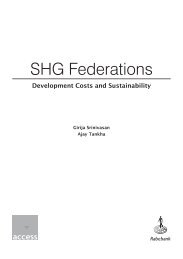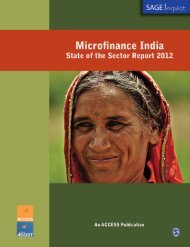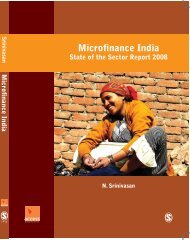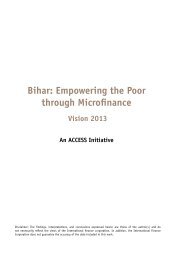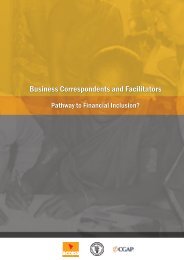Download sector_report1.pdf - Microfinance and Development ...
Download sector_report1.pdf - Microfinance and Development ...
Download sector_report1.pdf - Microfinance and Development ...
Create successful ePaper yourself
Turn your PDF publications into a flip-book with our unique Google optimized e-Paper software.
Progress under the SHG<br />
Bank Linkage Programme<br />
of non-borrowers is only 7 percent. As regards longevity, 16 it found that the proportion of<br />
defunct <strong>and</strong> broken groups was only 7 percent, which is low considering that average group<br />
age was 6 years. 17 While SHG longevity is not an end in itself, it is important that members are<br />
able to save <strong>and</strong> borrow in the group mode for as long as it is useful for them to do so, <strong>and</strong><br />
that they can graduate to more attractive alternatives such as savings <strong>and</strong> borrowing through<br />
the banks without causing groups to break up. New rather than restructured groups are<br />
"inefficient" in a global sense, since they increase promotion costs, <strong>and</strong> they entail having to<br />
start afresh in building credit-worthiness, impeding the flow of linkage credit. There is a need<br />
for SHPAs to conduct the action research to evolve more flexible mechanisms to allow new<br />
members to replace existing members, which would not only allow members to graduate without<br />
breaking their groups, but also, more challengingly, include among the replacements those<br />
hitherto excluded, by waiving the usual requirement that new members bring into the groups<br />
the same amount as the accumulated savings of existing members. Flexibility in this <strong>and</strong> other<br />
respects will place an even greater burden on book keeping skills, but would have a high pay off.<br />
Finally, on the "light" side, less than 10 percent of members had dropped out, over a third of<br />
them for reasons of migration, death or illness. The dropout rate was only marginally higher<br />
among the very poor, <strong>and</strong> just 10 percent of dropouts were in default.<br />
On the "shades" side however several of the findings are not so reassuring. While the number<br />
of dropouts is low, only a fifth of them were paid their full share of interest <strong>and</strong> other income<br />
on group operations when they exited, partly because the state of group accounts did not<br />
allow for a clear apportionment of surpluses over <strong>and</strong> above over accumulated savings. Clear<br />
guidelines <strong>and</strong> greater effort is needed on the part of SHPAs to ensure that dropouts receive<br />
not only their accumulated savings but also share of profits or surpluses so as not to discourage<br />
longer term memberships. 18<br />
Of greater concern perhaps is the phenomenon of exclusion, which keeps the depth of outreach<br />
to 51 percent. Self-exclusion as well as exclusion by existing group members <strong>and</strong> SHPAs is<br />
practiced for much the same set of reasons - (i) anticipated difficulty in meeting savings<br />
obligations, <strong>and</strong> in keeping up with loan repayments, as well as (ii) lack of underst<strong>and</strong>ing <strong>and</strong><br />
confidence in group processes, (iii) having to go outside the village for daily work which<br />
makes it difficult to attend weekly meetings, <strong>and</strong> (iv) caste <strong>and</strong> personality related antipathies.<br />
The study found no examples of SHPAs addressing the most important of these reasons -- the<br />
inability to save regularly by households with variable <strong>and</strong> uncertain incomes -- by introducing<br />
lower <strong>and</strong> more flexible savings requirements in keeping with varying cash flows.<br />
Issues of<br />
concern on the<br />
financial side<br />
include the<br />
state of group<br />
records, <strong>and</strong><br />
overdues within<br />
groups<br />
Issues of concern on the financial side include the state of group records, <strong>and</strong> overdues<br />
within groups (unfortunately, overdues from the groups to the banks were excluded from the<br />
terms of reference). The quality of group records would appear to be crucial to accountability<br />
<strong>and</strong> transparency within groups <strong>and</strong> (therefore to their longevity) <strong>and</strong> to providing the banks<br />
with the necessary comfort levels in loan appraisal <strong>and</strong> monitoring. 19 However record quality<br />
was assessed as being "good" in only 15 percent of the groups, "moderate" in 39 percent, <strong>and</strong><br />
"weak" in 40 percent (they were unavailable in the remaining 6 percent of groups). Passbooks<br />
however were up-to-date in 72 percent of the groups, although in the possession of the<br />
members themselves as opposed to group leaders or account keepers, which is important for<br />
transparency, in only 79 percent of the groups. The government promoted groups had the<br />
31


